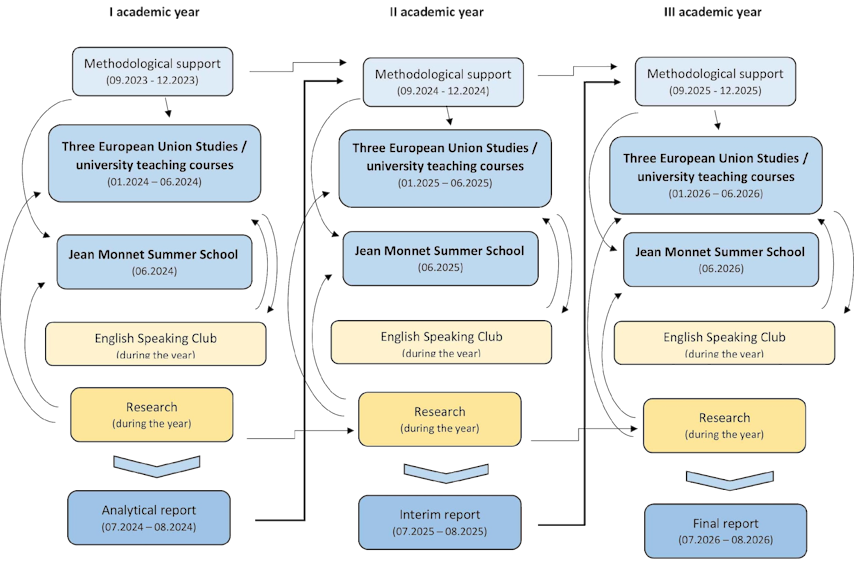About
The European Union is a global leader in environmentally friendly strategies, policies and practices, including climate change challenges. Reaching EU ambitious goals toward climate-neutral Europe relies on active involvement of governments, industry and citizens. The EU demonstrates that effective communication between all these parties is crucial for success.
The Jean Monnet Chair proposed aims to implement European Union studies on environmental management and communication into the curricula of Ukrainian students to increase their awareness in the subject and promote these approaches in Ukrainian society.
The main activities of the project imply implementation of three interconnected teaching courses for bachelor's students in environmental science and in biotechnology:
- European Union environmental policies and legislation
- European Union environmental project management
- European Union environmental communication
Additional activities of the project include annual Jean Monnet Summer School for policy makers, civil servants and civil society representatives for broader promotion of European Union values in Ukrainian society. English speaking club on effective communication for all interested participants aims to forge environmental communication in English.
The project will consist of 732 academic hours and involve about 540 learners. Indirect involvement through the project's website and sharing experience of learners will be up to one thousand people annually.
The main results of the project will be an increased awareness and practical skills of learners on effective environmental management and communication in the EU. The outputs of the project will include three European Union studies / university teaching courses, three manuals for university students, three peer-reviewed research papers, six reports at international conferences, and a website of the project.
About NUFT
The National University of Food Technologies (NUFT) is the leading university on food technologies in Ukraine which trains highly skilled professionals at the educational levels of Bachelor, and Master in 20 specialities and 44 specialisations for Food, Pharmaceutical Industries and Biotechnology. NUFT holds the status of higher educational institution of the IVth (highest) level of government accreditation.
There are 11 Faculties, 52 Departments, 5 Research Institutes, 2 Institutes of Postgraduate Education, 12 Colleges and Technical schools at NUFT. About 35 thousand students are studying at NUFT at the moment. Teaching staff of the university consists of about 600 teachers, including 21 Academicians, 100 Professors and Doctors of Sciences, and 420 Candidates of Sciences (PhDs).
NUFT library provides students with all necessary materials and information, with the amount of more than 1.2 million books and publications. The university has modern sport facilities, dining halls and hostels. Internet and modern computer technologies are widely spread within the university which enables students to master the use of ICT and receive up-to-date information.
The university has a long-term experience of international collaboration being a participant of many international educational/research communities and a participant of the international projects, including Erasmus projects.
The Department of Biochemistry and Environmental Control is preparing Bachelors, and Masters in Environmental Science, including Environmental Control and Audit. The curricula are being adapted to the demands of Bologna agreement. Graduates of the department are employed in private and government enterprises, public administration, research and academic institutions, including the Ministry of Ecology and Natural Resources, and Ministry of Agrarian Policy and Food of Ukraine.
Activitites of the proejct
Activities of the Chair will be organized in an annual cycle, where each next academic year will be the further development of activities of the previous year. The key activities of the project and their interconnections are represented in the chart below.
